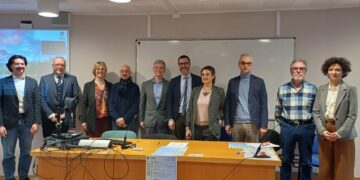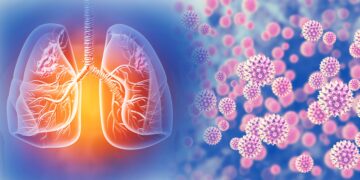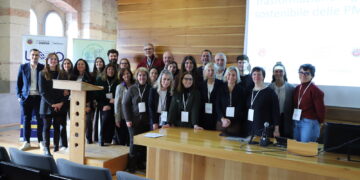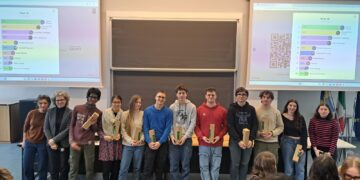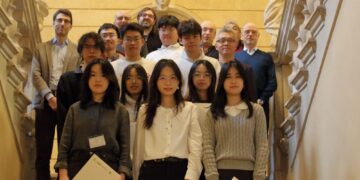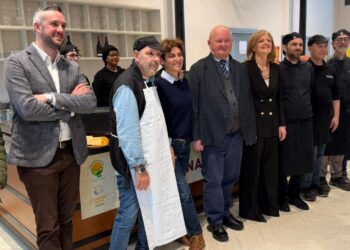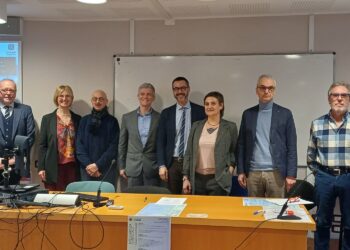“Conoscerlo per sconfiggerlo, alleanza contro Covid-19 (ENACT)” (Know it to defeat it, alliance against Covid-19 – ENACT) is an original medical research project that aims to tackle the Covid-19 pandemic with an integrated and multidisciplinary approach. In particular, the Project, launched last April, aims to define clinical-epidemiological, virological and immunological parameters able to clarify the mechanisms used by the virus to spread and cause such a devastating disease. This Project also represents an innovative model of collaboration between academic scientific research and private funders. Funded by Fondazione Cariverona with 2 million euros, along with a further contribution of €250,000 from Fondazione Tim, ENACT can therefore benefit from considerable resources made available in a short time, involving various groups from the University of Verona — in collaboration with the University Hospital of Verona (AOUI) — capable of ensuring scientific expertise and an unprecedented multi-disciplinary approach. Immunology, Infective Disease, Epidemiology, and Internal Medicine took on the challenge, also supported by the University’s governance, which made it possible to purchase materials and equipment in a very short time. About two months after its launch, ENACT presents a very first analysis of results.
The project results were presented at a conference held at the Hospital of Borgo Roma – Aula Magna De Sandre (Verona) and which saw the participation of the Rector Pier Francesco Nocini, the President of Fondazione Cariverona Alessandro Mazzucco, the Director of the University Hospital of Verona Francesco Cobello, the President of Gruppo Tim and Fondazione Tim Salvatore Rossi, and the Professors Vincenzo Bronte, Davide Gibellini, Domenico Girelli and Evelina Tacconelli, with Professor Giovanni Pizzolo as moderator.
The ENACT research group, coordinated by Vincenzo Bronte in the role of Principal Investigator, responsible for the Immunology strand of the Project, is comprised of the following scientists in charge of the other research strands: Evelina Tacconelli (Clinical Epidemiology), Davide Gibellini (Virology), Domenico Girelli (Clinical and Prognostic-predictive Factors). The Project also relies on a number of collaborators and experts from Verona and elsewhere, with specific scientific and clinical skills, such as Professors Claudio Lunardi, Ercole Concia, Marco Chilosi, Venerino Poletti, Claudio Doglioni and Dr. Massimo Valsecchi. Professor Giovanni Pizzolo is in charge of the general coordination of the Project.
The Project includes a number of subprojects:
Immunovid
Immunovid, which is carried out under the supervision of the immunologist Vincenzo Bronte, focuses on the understanding of the mechanisms underlying the immunological disorders caused by the Coronavirus infection. Several results have been obtained, some of which are being reviewed by international scientific journals. In particular, a molecular target has been identified, involved in the cascade of altered immunological reactions that lead to abnormal and often uncontrollable inflammatory states (the so-called ‘cytokine storm’), which can be deactivated by drugs available and generally used for other diseases. Researchers have been able to demonstrate that drugs capable of interfering with this molecular target restore immune system function in both patients and animal models. In more than 60 samples taken from Covid-19 patients, sequencing of messenger RNA (the system that carries the genetic information for protein production from DNA outside the nucleus) of cells in the blood or bronchoalveolar lavage fluid (which is closest to the main site of viral damage, the lung) was completed. These are more than 120,000 cells, an enormous amount of genetic information, whose bioinformatic analysis is underway at the Weizmann Institute in Israel, and which will allow a detailed molecular map to be drawn of each individual cell of the immune system — a sort of atlas of the action of the coronavirus at different stages of the disease.
The experimental phase of this study has already been completed, and the processing of all the data obtained — a highly complex process — is now underway. Finally, important results on the mechanisms of lung damage are emerging from the multidisciplinary collaboration of pneumologists and pathologists (Verona, Forlì, Milan). Molecular and immunohistochemical analyses carried out on lung biopsies of Covid-19 patients (a unique case study at international level) have highlighted, on early cases, very different patterns from those found in individuals who died of the disease, which will allow a better understanding of the evolution of lung disease and its potential outcomes.
ViroCovid
Supervised by the virologist Davide Gibellini, ViroCovid focuses on some aspects of virus biology, virus/cell interaction and the study of methods of diagnosis of viral infection. Some results have already been obtained in the specific lines of research. Results on the analytical validation (e.g. sensitivity and specificity of tests) of some rapid detection methods for serum and blood antibody detection in positive and uninfected individuals are now ready for publication. The results made it possible to determine the analytical performance of these methods and to perform a study on the kinetics of antibody appearance to show when these rapid techniques can be successfully used in clinical practice. These methods can be used as rapid screening and for epidemiological reasons, but cannot be considered as a suitable resource for the diagnosis of acute infection, confirming that the method of choice for early detection of SARS-CoV-2 infection is molecular (i.e. swabs). Moreover, studies are underway to define the impact of viral infection on target cells (e.g. respiratory epithelium cells) by molecular biology methods and in particular mRNA sequencing.
Researchers are also proceeding both with the molecular characterization of SARS-CoV-2 from clinical samples, and with the study of virus/cell interaction, in particular cloning procedures of SARS-CoV-2 genes: molecular systems called expression vectors will allow to study the biological activity of each specific viral protein within cells permissive to infection. The molecular analysis of these experiments will allow, in a short time, to describe some mechanisms by which the virus provokes cellular damage, and to identify new molecular targets for innovative therapies.
The COVID-19 VR Register
Under the supervision of the internist Domenico Girelli, this project consists in the installation at the University of Verona of a specific IT platform, characterised by high data storage and computational capacity, aimed at collecting and then analysing anamnestic, clinical, laboratory, instrumental and radiological data from all Covid-19 patients admitted to the University Hospital of Verona. When fully operational, the platform will contain the data, strictly anonymous, not only of patients admitted to the various Covid Units, but also of those assessed in the ER and then discharged to home therapy. It will therefore provide a complete overview of the various stages of disease, from the mildest to the most severe ones, i.e. patients who required hospitalisation in semi-intensive or intensive care.
The Register contains data of more than 600 patients, for each of whom a large number of variables have been collected, and are now being analysed, and are able to provide predictive models of the course of the disease, the risk factors and any protective factors. Collaborations are already underway with various institutions and prestigious scientific societies, including Mario Negri of Milan and the Italian Society of Internal Medicine (SIMI), that set up similar Covid-19 Registers: this will make it possible to group together the overall case histories of several thousand patients and will provide information of great impact for the clinical management of SARS-CoV-2 disease. The first data collected has already formed the basis of some scientific articles now in the process of publication or under review in scientific journals at international level. These include a study that demonstrates the high prevalence (28%) of asymptomatic deep vein thrombosis (DVT) in patients hospitalised for Covid-19. DVT is an important precursor of a potentially fatal complication such as pulmonary embolism, but it can be prevented by using anticoagulant medicines.
Another study, developed by researchers from the Neurological Clinic, assessed brain damage in Covid-19 patients through the determination of an innovative biomarker, i.e. the neurofilament light chain. This study confirmed that Covid-19 is a disease that unfortunately not only affects the lungs, but can also affect many other organs, including the central nervous system. With regard to underlying conditions, another study showed that bronchial asthma is surprisingly a protective factor against the development of severe forms of Covid-19. Finally, projects are underway on the haematological complications of SARS-CoV-2 infection, in particular on anaemia and iron metabolism, which is also essential for immune regulation.
REACT-COVID-19
Conducted under the supervision of the Infectious Disease specialist Evelina Tacconelli, REACT-COVID-19 studies in detail the clinical and epidemiological aspects of Covid-19 in hospitalised patients, healthcare workers and cohabitants of healthcare workers. The aim of the project is to define, by using advanced artificial intelligence methodologies, predictive models for early identification of patients at high risk of contracting a severe form of Covid-19 and/or requiring hospitalisation in intensive care and mechanical ventilation. More than 400 patients with Covid-19 have already been included in the study, and preliminary data show that some intelligent systems are able to predict, using non-complex laboratory information, which patients are more likely to die or suffer from severe clinical development with short and long-term complications with high specificity and sensitivity. Predictive models are differentiated based on each patient’s gender, age, underlying conditions, and time elapsed between first symptoms and hospitalisation. The study also assesses whether changes in the composition of the intestinal microbiome may have an impact on the evolution of Covid-19 and the risk of bacterial super infections.
In addition, REACT-COVID-19 assesses the transmission of SARS-COV-2 between healthcare workers and their cohabitants and includes, on a voluntary basis, all healthcare workers (doctors and nurses) of the University Hospital of Verona and general practitioners of ULSS9. Healthcare workers and their cohabitants perform IgG/IgM determination with rapid test. In the case of a positive test (IgG and/or IgM), the individual undergoes a nose-pharyngeal swab to detect any infection in progress and risk of transmission. To date, 1,518 serological tests have been performed in operators in dedicated Covid areas that have recorded a 10% serological positivity among operators and 3% among their cohabitants. All individuals tested were asymptomatic and all swabs were negative.




